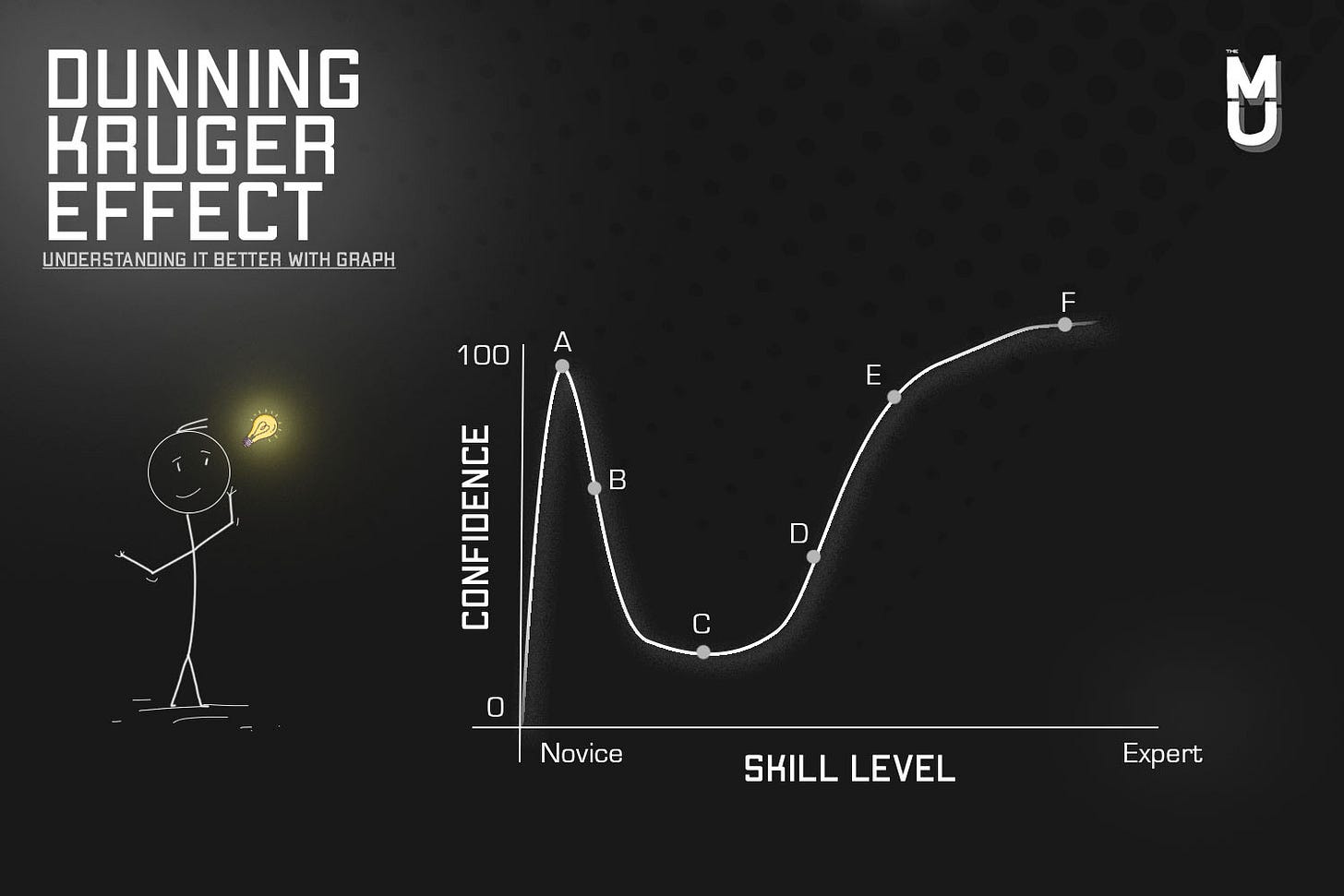Everyone wants to learn new skills rapidly in this day and age. Seriously, who doesn't? After all, you can set yourself up for a successful life with your knowledge and skills… right? Yes, only as long as you can assess your confidence concerning your wisdom. This brings me to the Dunning-Kruger effect.
What is The Dunning-Kruger Effect?
It is a cognitive bias (read about confirmation bias here), where individuals who are still in the beginner phase of learning or lack experience in their field of expertise, tend to be overconfident in their knowledge. Let me break this textbook definition down into a graph.
A little graph analysis…
A → The confidence spike occurs when you know a little, yet you feel like you know it all.
B → The realisation curve, you start to realise how broad and complex the subject is, usually, the point where most people give up.
C → The valley of despair, If you haven't already given up, you might start regretting your choices.
D → The fog of hope, Things gradually start to make sense.
E → Overcoming your challenges, you have successfully overcome your fears and regrets.
F → Reaching mastery, you have gathered knowledge, experience and confidence.
Simply put, there is a huge confidence boost in your initial learning phase, but as you become more aware of what you’re learning, things begin to get messy and challenging, and your confidence takes a dip. However, if you press on regardless, you’ll eventually see a point of hope and then finally achieve stability and mastery.
The most deadly part of this graph is point A as it can lead to some detrimental situations, from failing a test to losing a job to even sometimes loss of life. Sometimes this isn’t true. There are pseudo-positive effects of this too. I’ll get to that in a moment. First, let us look at some examples so that you can relate more to this.
Common Occurrences of Dunning Kruger effect
One of the best ways to learn about life is to observe and absorb what others have gone through. Consequently, highlighting a few instances of the Dunning-Kruger effect should help to ensure that you don't fall victim to it.
Choosing your subjects - For all my friends, including myself and you perhaps, we can end up choosing subjects or courses based on how and what we have learnt before, not realising how complex it can become.
Completing a course - This is rather typical, as when we finish a course, we get the illusion of knowing every aspect of our subject though this isn’t true till we have experience applying it in the real world.
Investing - As soon as individuals learn about the world of investing, it can be tempting to invest in risky stocks to make quick money.
Self-diagnosis - Due to the internet now, people commonly overestimate their capacity for medical diagnosis, leading to delays in seeking necessary care or misdiagnosis.
Driving - This effect is ubiquitous in the field of driving. People tend to overestimate their driving skills very quickly, resulting in accidents.
Psuedo-positive effects
This is where I contradict myself. Well, sort of. You see, usually, beginners can become better influencers. Why? You may ask. Mainly because relating to beginners who are just slightly more confident than you is much easier than to a professional who might have forgotten what the beginners go through. Another thing to note is that, in my opinion, hype and zeal are slowly becoming more prevalent in this modern world. In context to the graph, someone at point A has enough pseudo-confidence, which naturally brings about hype and enthusiasm to intimidate and potentially suppress someone at point B or C.
“Fake It Until You Make It”
If you’re into the self-help niche, you have probably heard of the phrase "Fake it until you make it." If not, it implies that until you actually have confidence, you pretend to have it. It may sound similar, but there are a few key differences. For instance, if you’re anxious to step up on stage and give a speech, you pretend and trick yourself into thinking it is simple. Second, the primary distinction is that you are aware of your lack of expertise, and you realise you can’t use it as deception or dishonesty to do something for which you aren’t qualified. Those who experience the Dunning-Kruger effect lack self-awareness and are overconfident.
Avoiding it
You can fall for the Dunning-Kruger effect due to ignorance and lack of self-awareness. So, the best ways to decrease them are -
Being open to feedback - Lets you know what you need to improve on
Comparing yourself to others - Leads to self-discovery and motivation but make sure not to be extreme
And lastly, as cliché as the following two points might sound, I am sorry, they have to be said
Be honest with yourself - Make sure you realise where you stand
Learning never ends - Even if you’re an expert, there is always more to learn
Lastly,
In the words of the famous Greek Philosopher Socrates -
“There is only one good, knowledge and one evil, ignorance”
Thanks!
Thank you for taking the time to read this article on The Dunning-Kruger Effect. If you found it engaging and informative, please leave a like.
Have opinions on this topic? Don’t forget to share them
If you have not already, you can subscribe below to receive these articles directly in your inbox as soon as they are published.




